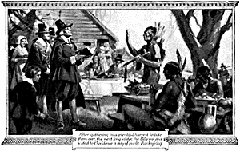
"After gathering in a plantiful harvest to tide them over the next long winter, the Pilgrims dedicated to Providence a public day of Thanksgiving."
The Pilgrim's first Thanksgiving was held in 1621, to celebrate the harvest reaped by the Plymouth Colony after a harsh winter. In that year Governor William Bradford proclaimed a day of thanksgiving. The colonists celebrated it as a traditional English harvest feast, to which they invited the local Wampanoag Indians.
Days of thanksgiving were celebrated throughout the colonies after fall harvests. All 13 colonies did not, however, celebrate Thanksgiving at the same time until October 1777. George Washington was the first president to declare the holiday, in 1789.By the mid-1800s, many states observed a Thanksgiving holiday. Meanwhile, the poet and editor Sara Josepha Hale had begun lobbying for a national Thanksgiving holiday. During the Civil War, President Abraham Lincoln, looking for ways to unite the nation, discussed the subject with Hale. In 1863 he gave his Thanksgiving Proclamation, declaring the last Thursday in November a day of thanksgiving.
In 1939, 1940, and 1941 Franklin D. Roosevelt, seeking to lengthen the Christmas shopping season, proclaimed Thanksgiving the third Thursday in November. Controversy followed, and Congress passed a joint resolution in 1941 decreeing that Thanksgiving should fall on the fourth Thursday of November, where it remains.




